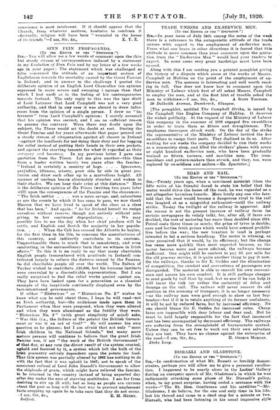TRADE UNIONS AND EX-SERVICE URN. [To THE EDITOR. OF• THE
" SPECTATOR."]
Sra,—In your issue of July 24th among: the. notes of the week there is a reference to the antagonistic attitude of the trade unions with regard to the employment of ex-Service men. From what one hears in other directions it is feared that this attitude is more common than your comment upon the quota- tion from the " Ex-Service Man " would lead your readers to expect. In some cases very great hardships must have been caused.
Along with this I am sending you a printed: pamphlet giving the history of a dispute- which arose at the works- of Messrs. Campbell at Halifax- on the point of the employment of ex- Service- men. The account is interesting and well worth read- ing in full. One does- not know how to comment upon the Ministry of Labour which first of all asked Messrs. Campbell to employ the men, and at the first hint of trouble asked the
men to withdraw.—I am, Sir, &c., A SCOTT YOUNGER. 26- Dalkeith Avenue, Dumbreck, Glasgow.
[The pamphlet, entitled The Campbell- Strike, is issued by the Campbell Gas Engine Company. of Halifax. It deserves the widest publicity. At the request of the Ministry of Labour this company in the summer of 1919 engaged_ five ex-soldiers in order to train them as fitters and draughtsmen. The employees thereupon struck work. On the day of the strike the representative of the Ministry. of Labour invited, the five ex-soldiers to resign their posts. They declined to do so. After waiting for six weeks the company decided to run their works as a non-society shop, and filled the strikers' places with seven or eight hundred ex-Service men, who have been gradually trained as fitters, turners, and machine men. The iron- moulders and. pattern-makers then struck, and they, too, were replaced by ex-soldiers and sailors.—En. Spectator.]


































 Previous page
Previous page